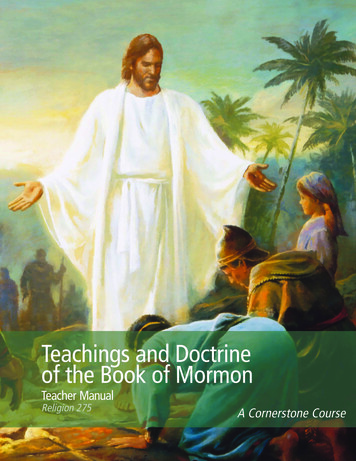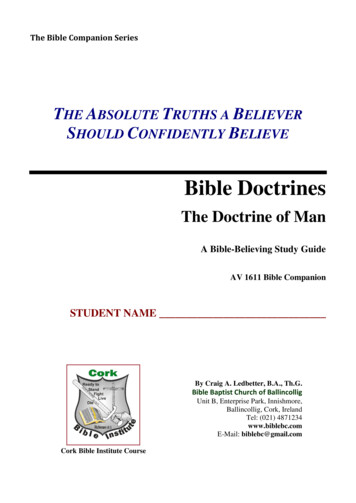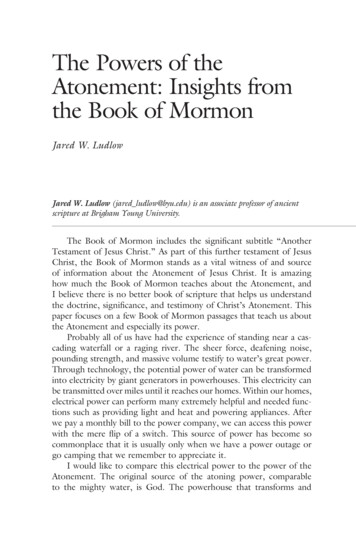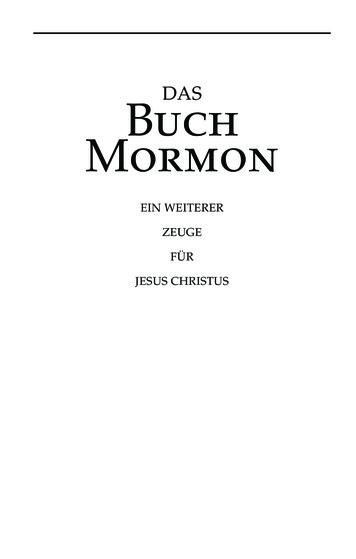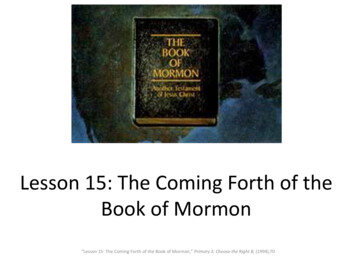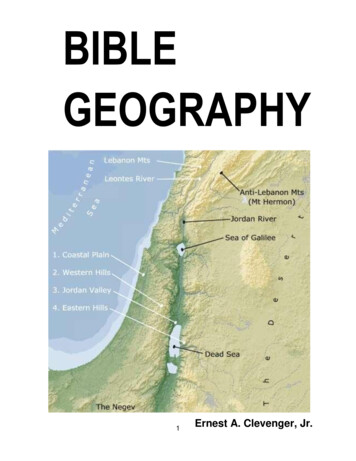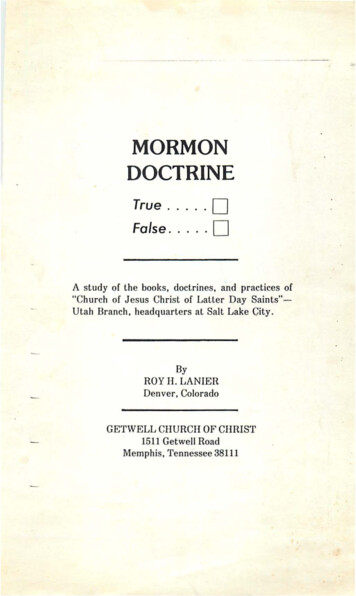
Transcription
MORMONDOCTRINETrue.False.D.D.A study of the books, doctrines, and practices of"Church of J esus Christ of Latter Day Saints"Utah Branch, headquarters al Salt Lake City.ByROY H. LANIERDenver, ColoradoGETWELL CHURCH OF CHRIST1511 Getwell RoadMemphis, Tennessee 38111
III IIINTRODUCTIONT he writer of this pamphlet can find no betterwords to express his reason for writing than those ofone of the greatest apostles among Latter Day Saintsconcerning the Book of Mormon. Apostle Orson Prattsaid:"The Book of Mormon must be either true offalse . . . . If False, it is one of the most cunning,wicked, bold, deep-laid impositions ever palmedupon the world; calculated to deceive and ruinmillions who will sincerely receive it as the word ofGod, and will suppose themselves securely builtupon the rock of truth until they are plunged, withtheir families, into hopeless despair. The nature ofthe book of Mormon is such that, if true, no one canpossibly be saved and reject it; if false, no one canpossibly be saved and receive it. Therefore, everysoul in all the world is equally interested inascertaining its truth or falsity . .If, after rigidexamination, it be found an imposition, it should beextensively published to the world as such. Theevidence and arguments upon which the imposturewas detected should be clearly and logically stated,that those who have been sincerely, yet unfortunately , deceived may perceive the nature of thedece ption, and be reclaimed, and t hat those whocontinue to ublish the delusion may be exposedand silenced .' (Introduction to Divine Authenticityof the Book of Mormon, pp. 124, 125.)The reader's attention is called to two statementsin the above which serve as my reasons for writingthis pamphlet. First, if the Book of Mormon is true, noone can possibly be saved and reject it; but if it is falseno one can believe it and be saved. I agree with this3
statement. I also believe the Book of Mormon is nottrue. Hence I feel an obligation both to those whobelieve and those who now do not, but may be led tobelieve it. I wish to save those who now receive it;and I have hopes of saving some who might otherwisereceive it as truth. My second reason is based on Mr.Pratt's statement that, if after examination, "it befound an imposition, it should be extensivelypublished to the world as such." I have unanswerableproof that the Book of Mormon, as well as the Doctrineand Covenants, is not inspired, that they areself-contradictory, that they contradict each other,and that they hopelessly contradict the Bible. IfApostle Pratt had had this information in his day, nodoubt he would have published it to the world; andsince he invited me to publish it that people whobelieve the books "may be reclaimed, and that thosewho continue to publish the delusion may be exposedand silenced," I feel free to do so with the hope that hisbrethren of Latter Day Saints will give the mattertheir respectful and careful attention.In the beginning of this work allow me to say that Irespect the sincerity of the Latter Day Saints, andthat I am not in sympathy with many of their enemieswho charge them with being guilty of every sin in thecatalogue of wickedness and immorality. V Andthroughout this pamphlet no quotation from suchenemies will be used. If the writings of Latter DaySaints themselves do not furnish sufficient proof thattheir books are not inspired, I am ready to acceptthem. If appeal has to be made to their bitter4
. --·------- · - - -prejudiced enemies, I, for one, am ready to accept anddefend their doctrines. Hence I propose to base thisexamination on the books they accept as inspired. Reference will be made to a few other books on purelyhistorical points, and then only to those writers whoare fair in their dealings.WRITING OF THE PLATES:Latter Day Saints confidently believe the Book ofMormon to be inspired, but from the statements ofthose who it is claimed made the plates, we arejustified in saying they did not claim to be inspired.Nephi said:"Yea, I make a record in the language of myfather, which consists of the learning of the Jewsand the language of the Egyptians. And I knowthat the record I make is true; and I make it withmine own hand; and I make it according to myknowledge." (1 Nephi 1:2,3.)"Nevertheless I do not write anything upon theplates save it be that I think it be sacred. And now,if I do err, even they did err of old." (1 Nephi 19:6.]ILILFirst, notice that Nephi did not claim to beinspired; he simply wrote "according to his knowledge:' And even the matter which he wrote was notgiven by inspiration; he had to select from his store ofknowledge what things to write. He says he wascareful in his selection of what he wrote, and wrotenothing "save it be that I think it be sacred." Next, headmits that he might err in his selection of what hewrote. That certainly does not sound like he waswriting a message given him by revelation from God,5
for if it had been direct from God he would not havehad to select what he wrote, and there would havebeen no possibility of an error. Next, notice he saidhis record was in "the language of my father," andthen in the next phrase he said it was in the "languageof the Egyptians." Nephi was a Jew who lived inJerusalem in the "days of Zedekiah, king of Judah,"according to the story. How could the record be in thelanguage of his father, a Jew, and yet in the languageof the Egyptians? The Book of Mormon contradictsitself in the first three verses!Another writer of the Book of Mormon makes itequally clear that he did not write by inspiration.Jacob said:"And he gave me, Jacob, a commandment that Ishould write upon these plates a few of the thingswhich I considered to be most precious." (Jacob1:2.). And it came to pass that I, Jacob, began to beold; and the record of this people being kept on theother plates of Nephi, wherefore, I conclude thisrecord declaring that I have written according tothe best of my knowledge." (Jacob 7:26.)According to the story Jacob wrote to . the best ofmy knowledge." Men inspired often wrote things, themeaning of which they did not know; neither doinspired men claim the things they write to be of theirknowledge, but of that which God supplies. Butanother writer admits imperfections and makesexcuses for them. Hear Mormon:"Condemn me not because of mine imperfection,6
neither my father because of his imperfection,neither them who have written before him . Andnow, behold, we have written this record accordingto our knowledge. . . And if our plates had beensufficiently large we would have written inHebrew; but the Hebrew hath been altered by usalso; and if we could have written in Hebrew,behold, ye would have had no imperfection in ourrecord." (Mormon 9:31-33.)I'--'--ILHere again it is said that the records were made. according to their knowledge" and not by inspiration.They admit there are errors in their records, andexcuse them on the grounds that they had to write inthe . reformed Egyptian" language instead of theirnative Hebrew, but failed to give us any reason whythey could not use their native Hebrew. Can oneconceive of the Apostle Paul admitting that somethinghe wrote might be wrong, and excusing himself on theground that he was writing in Greek instead of hisnative tongue? But the very Title Page of the Book ofMormon admits that there are mistakes, but excusesthem on the ground that men (just what men we knownot) make mistakes. The statement reads: .And now,if there are faults they are the mistakes of men." Butinspired men do not make mistakes in the matterwhich they write, for it is given them by the HolySpirit who makes no mistakes. But in the face of allthese admissions by the writers, and in the face of allthe mistakes we will point out in the following pages,Joseph Smith, Jr., said: "I told the brethren that theBook of Mormon was the most correct of any book onearth." (Compendium, p. 273.)7
TRANSLATION OF THE PLATES:From the statement made by Smith one wouldexpect to find the Book of Mormon as near perfectionas man aided by the Lord can possibly make a book.Added to that when we see how it was written we willhave the right to expect it to be absolutely faultless.Joseph Smith, Jr., claimed to find some plates in a hillin New York state on which was engraved thecontents of the Book of Mormon. With the help ofstones provided by the Lord, call Urim and Thummim,he translated the writing on the plates. The work oftranslating was done in such way that it wasimpossible for them to make mistakes. Hear whatthey say:"The prophet, scanning through the Urim andThummim, the golden pages, would see appear, inlieu of the strange characters thereon, theirequivalent in English words. These he wouldrepeat and the scribe, separated from him by a veilor curtain, would write them down . Until thewriting was correct in every particular, the wordslast given would remain before the eyes of thetranslator, and not disappear.But on thenecessary correction being made, they wouldimmediately pass away and be succeeded byothers." (History of Church by Brigham H.Roberts, p. 28.)"I will now give you a description of the mannerin which the Book of Mormon was translated.Joseph Smith would put the seer stone into a hat,and put his face in the hat, drawing it closelyaround his face to exclude. the light; and. in thedarkness the spiritual light would Shine. A piece ofsomething resembling parchment would appear,8
and on that appeared the writing. One character ata time would appear, and under it was theinterpretation in English. Brother Joseph wouldread off the English to Oliver Cowdery, who wasthe principal scribe, and when it was written downand repeated to Brother Joseph to see if it wascorrect, then it would disappear, and anothercharacter with the interpretation would appear.Thus the Book of Mormon was translated by thegift and power of God, and not by the power of anyman." (Address to Believers, David Whitmer, p.12. Whitmer was one of the three originalwitnesses of the Book of Mormon.)From this we gather first, that Joseph Smith, Jr.,was not the translator of the plates at all. Every Bookof Mormon carries on its Title Page, "Translated byJoseph Smith, jun." But if these witnesses tell thetruth he did not translate at all. The translation wasmade by the "seer stone" or "Urim and Thummin," andSmith merely read off the translation to the scribe.But in the next place, if this is the way the translationwas made there was absolutely no chance for amistake to be made. If a mistake was made, even tothe spelling of a word or a punctuation, the "words lastgiven would remain" until the necessary correctionwas made. So, if the printer did not make a mistake,we may expect the book to be perfect in every respect,in spelling, grammar, etc. But such is not true.Fortunately we have a statement from one in theprinting office as follows:"I helped read proof on many pages of the book,and at odd times ·set some type. . . .Thepenmanship of the copy furnished was good, butthe grammar, spelling and punctuation were done9
by John H. Gilbert, who was chief composer in theoffice. I have heard him swear many a time at thesyntax and orthography of Cowdery, and declarethat he would not set another line of the type.There were no paragraphs, no punctuation and nocapitals. All that was done in the printing office,and what a time there used to be in straighteningsentences out." (Truth About Mormonism, bySnowden, p. 68.)Again we read, "The book passed into a fluidcondition and assumed a different form with everyedition. In 1842 an edition apr,eared bearin on itstitle page the announcement, Carefully revised bythe translator,' and such corrections have continued and accumulated so that 'a comparison of thelatest Salt Lake edition with the first has shownmore than three thousand changes.' " (Ibid, p. 69.)That the reader may know the nature of some ofthe mistakes, we give a few among the many whichmight be given. From the 1830 edition, which is thefirst, I have copied the following: "the priests was", p.193; "They was added," p. 192; "they did not fightagainst God no more," p. 290; "that all might see thewriting which he had wrote upon the rent," p. 351: "Ihave wrote them," p. 506; "I were about to write," p.506; "teach baptism unto they," p. 506; "this thing hadought not to be," p. 582; "and this he done," p. 224.These samples bear out the statement of the printer.Such mistakes might be excused if they had not madesuch claims, as the statements quoted, as to themanner of the translation. They tried to make itappear that the translation was made in such way thatGod said just what he wished to say in the Book ofMormon, in exactly the way he wished to say it; and10
that there was no chance for man to alter it, for if anychange or mistake of any kind was made, the wordswould not disappear until the "necessary correction"was made. If the thoughtful reader of the first editionof the Book of Mormon believes Smith's statements asto the manner of translation, he must conclude thatthe God of the Book of Mormon was very ignorant ofthe use of language. But if the reader does not believeSmith's statements as to the manner of translation,how can he have any faith in anything Smith said?There is another strange thing about the wordingof the Book of Mormon. The plates were written,some of them as much as six hundred years beforeChrist, and others in the first century, while otherswere written in the fourth century after Christ. TheKing James version of our Bible, called the AuthorizedVersion, was written in 1611 A.D. Students of theBook of Mormon say that, at least one-eighteenth ofthe book consists of word-for-word quotations fromthis version of the Bible. How could they have quotedit word-for-word hundreds of years before it waswritten? But that is not all. There are some errors inthe King James version of our Bible. For instance thatversion makes Paul say, "Love is not easilyprovoked." (1 Cor. 13:5.) What Paul actually said is,"Love is not provoked." The King James translatorsadded the word easily, but put it in italics to show thatthere was no word in the Greek manuscript for it. Butin the Book of Mormon, (Moroni 7:45), supposed tohave been written on a plate in A.D. 400-1200 yearsbefore the King James translation was made-we11
read that love "is not easily provoked." This one thingalone proves that the material in the Book of Mormpnwas composed after 1611, the date of the AuthorizedVersion of our Bible; this proves the Book of Mormonis not inspired; that it is a fraud.The translators of our English versions believed inand practiced sprinkling. If they had translated theGreek word "baptizo," which is dip or immerse, theywould have destroyed their practice of sprinkling. So,instead of translating it, they spelled out the Greekword with English letters; such is the origin of theEnglish word "baptize." But the writers of the platesfrom which the Book of Mormon was translated usedthe word baptize as frequently as they used any otherword; even Adam was baptized, and nearly everybodyfrom his day to this have been baptized, or someonehas been baptized for them, according to the Bookof Mormon and Latter Day Saints' writings. Theexpression "fifth column" is of recent origin. If youwere to read a book supposed to have been written inthe days of King Arthur in which some of his knightswere said to have used "fifth column" tactics, wouldyou believe it to be of ancient origin? No thoughtfulreader could believe it. Here we have a word thatoriginated with English translators, yet we haveplates supposed to have been written 600 B.C. whichcontain it. The word was used hundreds of yearsbefore its origin.But here is something stranger still. In 2 Nephi12
1:14 we have a quotation from Wm. Shakespeare,"from whence no traveler can return."EitherShakespeare found the plates before Smith did andquoted from them, or the author of the Book ofMormon quoted from Shakespeare. I prefer to believethe latter which proves that the Book of Mormon wascomposed since the days of Shakespeare.Here is another thing about the translation of theBook of Mormon which should make the thoughtfulreader wonder:"But the Lord knoweth the things which wehave written, and also that none other peopleknoweth our language; therefore he hath reparedmeans for the interpretation thereof." (Mormon9:34.)Yet in the Pear) of Great Price, p. 55 (Joseph Smith2:64} we read Smith's account of Martin Harris' trip toProf. Anthon of New York City:"Professor Anthon stated that the translationwas correct, more so than any he had before seentranslated from the Egyptian. I then showed himthose which were not yet translated . and he saidthey were true characters . . . and that thetranslation of such of them as had been translatedwas also correct."Now, if "none other people knoweth our language,"and if these writings could not be translated except bythe means prepared by the Lord for their translation,how could Prof. Anthon, though a noted linguist,translate them or know whether they were correctly13
translated? The thoughtful reader can not accept bothstatements; yet both are supposed to be inspired. Oneof these statements is false. and it makes no differencewhich since both are supposed to be inspired.THE GOD OF THE LATIER DAY SAINTS:I read a statement once concerning the God of theLatter Day Saints which I thought was unfair andcould not be proved. The statement follows:"When the mask is thus torn off the MormonGod, 'the Eternal Father,' we see a hideousdisclosure of fleshly polygamous gods reveling insexual propagation through all eternity. Such aGod or gods are the proper father of such a systemof faith and practice, and such a system is theproper and necessary offspring of such sensual andpolygamous gods." (Truth About Mormonism," p.129.)But further investigation of the writings of LatterDay Saints themselves has forced me to accept thestatement as true, in spite of the fact that the firststatement in their ARTICLES OF FAITH reads, "Webelieve in God, the Eternal Father." Do they believethat God is eternal? Yes, in the same way that anyman may be eternal! but in no other way. But read:"Gods, angels and men are all of one species,one race, one great family, widely diffused amongthe planetary systems, as colonies, kingdoms,nations, etc." (Key to Theology, p. 39.)14
"God himself was once as we are now, and is anexalted man. . . . It is necessary that we shouldunderstand the character and being of God, andhow he came to be so; for I am going to tell you howGod came to be God. We have imagined andsupposed that God was God from all eternity. I willrefute that idea, and will take away and do awaywith the vail so that you may see . God himself,the Father of us all, dwelt on an earth, the same asJesus Christ himself did . And you have got tolearn how to be Gods yourselves." (Joseph Smith,Jr., in sermon in Nauvoo, April 6, 1844, copied bythe writer from Journal of Discourses, V. 6, pp. 3,4.)"The Father has a body of flesh and bones astangible as a man's; the Son also: but the HolyGhost has not a body of flesh and bones, but is apersonage of Spirit." (Doctrine and Covenants130:22-accepted as inspired by L.D.S.)Let us draw a few deductions from the foregoing.First. God is of the same species as man; was once aman as we are, and is now an exalted man. Hence Godis not eternal in any way that any man on earth maynot be eternal. Second, Smith tried to refute the ideathat God has been "God from all eternity." So thedoctrine is absolutely opposed to the orthodox idea,supported by the Bible. that God is God fromeverlasting to everlasting. (Pea. 90:2.)But here is an interesting statement. "The Fatherhas a body of flesh and bones. But the Holy Ghosthas not a body of flesh and bones, but is a personage ofSpirit." From this I gather that a "personage of15
Spirit" has not a body of flesh and bones, and trulythere is no other conclusion to reach. But in the samebook, Doctrine and Covenants, page 54, I read:"There are two personages who constitute the great . power over all things. They are the Father and theSon-the Father being a personage of Spirit, glory,and power." A "personage of Spirit" has not flesh andhones, but the Father is a personage of Spirit and yethas a body of flesh and bones. Two statements couldnot possibly be more contradictory, yet they camefrom the same man, supposed to be inspired; and arecarried in the same book by the authority of theChurch of Latter Day Saints, which is supposed to beinspired in the things they leach. Both statements cannot he true, so at least one of them is not inspired,which destroys our faith in the book as being fromGod.Rut that God is no more eternal than is man mustbe inferred from the following statement from JosephSmith, Jr., founder of the Latter Day Saints Church:"The mind or the intelligence which manpossesses is co-equal with God . The intelligenceof spirits had no beginning, neither will they havean end . for they are co-equal with our Father inheaven . This is good doctrine. It tastes good. Ican taste the principle of eternal life, and so canyou. They are given me by revelation of JesusChrist." (Journal of Discourses, V. 6, pp. 6, 7.)In answer to things of this kind Smith's followersoften say that they do not necessarily accept all that16
he said: that many times he spoke when not under theguidance of the Holy Spirit. But this time he declaredhe got these things "by revelation of Jesus Christ."And too, there is a commandment which says:Wherefore, meaning the church, thou shalt giveheed unto all his words and commandments whichhe shall· give unto you as he receiveth them,walking in all holiness before me; for his word yeshall receive, as if from mine own mouth, in allpatience and faith." (Doctrine and Covenants,21:4, 5.)So we do them no injustice when we take thewords which Smith says he got by revelation fromJesus Christ. But in spite of the fact that humanspirits are said lo be co-equal with God, we read:"The business of these deities is the propagationof souls to people bodies begotten on earth . . . .Polygamous marriage is supposed to make possiblethe procreation of enough bodies for thousands ofspirits which have long awaited incarnation."(Eleventh Edition Encyclopaedia Britannica, Article Mormons.)I;iiAccording to the revelation which Smithclaimed to receive on plural marriage, numerouswives were given men "for their exaltation in theeternal worlds, that they may bear the souls ofmen." (Doctrine and Covenants, 132:63.)IJIFrom these passages we gather that the gods andtheir numerous wives, which they took from someearth with them, are maintaining sexual relations toproduce the human spirits which inhabit the human.JJ17
bodies produced here by human relations. If the godsare producing the spirits, how could those spirits beco-equal with the gods? They could be no moreco-equal with the gods than human bodies can beco-equal with the parents' human bodies thatproduced them. But that I do not put an unfairinterpretation on -the words, "that they may bear thesouls ol men" I quote a statement in the foot-notewhich is their interpretation:"Th is, the souls or spirits of men to be born inheaven.But that doctrine is common among them, beingfound in books which are accepted among the LatterDay Saints as authority. The following statement willbe sufficient:"As God the Father begat the fleshly body ofJesus, so he, before the world began, begat hisspirit. As the body required an earthly mother, sohis spirit required a heavenly mother. As Godassociated in the capacity of a husband with theearthly mother, so likewise he associated in thesame capacity with the heavenly one." (The Seer,pp. 158, 159.)There are many among Latter Day Saints whobelieve that Adam is the only God this world has. Andwell may they believe it, because Brigham Young,President, prophet, and revelator of the church taughtit by tongue and pen. He said:"When our father Adam came into the Garden18
of Eden, he came into it with a celestial body, andbrought Eve, one of his wives, with him . He isour Father AND OUR GOD, and the ONLY GODWITH WHOM WE HA VE TO DO:' (Journal ofDiscourses, V.1, p. 50.)"He (Adam) helped to make this world, and wasthe chief manager in that operation. He was theperson who brought the animals and the seeds fromother 'planets to this world, and brought a wife withhim and stayed here. You may read and believewhat you please as to what is found written in theBible. Adam was made from the dust of an earth,but not from the dust of this earth." (J. of Dis. V.3, p. 319.)LATTER DAY SAINTS AND JESUS CHRIST:Those who accept the Adam·God theory think thatJesus Christ was not begotten by the Holy Spirit, butby Adam. (J. of Dis. V. 1, p. 50.) But the Book ofMormon teaches that he was begotten by the HolySpirit. (Alma 7:10.) But it is generally believedamong them that both the Father and the Son havebodies of "flesh and bones as tangible as man's." (Doc.& Cov.130:22.) An authoritative source further says:"Jesus Christ and his Father are two persons.Each of them has an organized, individualtabernacle, embodied in material form, andcomposed of material substance, in the likeness ofman, and possessing every organ, limb andphysical part that man possesses." (Key toTheology, pp. 39, 40.)19
It is hardly worth while to offer denial to much ofthis material, but here it is in place to quote the wordsof Jesus when he said, "God is a Spirit." (John 4:24.)But Latter Day Saints say he is "embodied in materialform," and that he has "flesh and bones." WhenJoseph Smith wrote his "inspired translation" of theBible, he left out that statement of Jesus.But again, the "Saints" believe Jesus practiced"plural marriage. (They dislike to hear it called"polygamy, so I refrain from the use of that term.)Apostle Orson Hyde said, in Sermon 3: "We say it wasJesus Christ who was married (at Cana to the Marysand Martha) whereby he could see his seed before hewas crucified." Again, "If all the facts were written,we. no doubt, would learn that these beloved womenwere nis wives." (The Seer, p. 159.) Of course theyoffer absolutely no evidence for this, and the Book ofMormon characterizes one as guilty of whoredom whohas more than one wife. (Jacob 2:27, 28.) Thusaccording to the Book of Mormon and "The Seer"Jesus would be guilty of sin. But that is no morecontradictory than their writings are in a hundredother places, as we shall see.LATTER DAY SAINTS AND THE HOLY SPIRIT:According to the L.D.S. the Holy Spirit is not aperson, but nothing more than matter refined to thehighest degree. We read:"But the Holy Ghost has not a body of flesh andbones, but is a personage of Spirit. Were it not so,20
the Holy Ghost could not dwell in us. (Doc. & Cov.130:22, 23.)"There is no such thin as immaterial matter.All spirit is matter, but it 1s more fine or pure, andcan only be discerned by purer eyes.' (Ibid.,131:7.)From these statements we learn that "all spirit,"including the Holy Spirit, is matter. Yet we read thatJesus possesses "the .same mind with the Father,which mind is the Holy Spirit.'' (Doc. & Cov., p. 55,1901 Salt Lake Edition.) "God is a Spirit," says Jesus,but according to Joseph Smith, Jr., he has a materialmind. But further we read another authority:"The Holy Spirit is in a class with magnetism orelectricity. He is a divine fluid, composed ofmaterial atoms or particles, or in other words animpersonal energy or cosmic force through whichGod acts." (Key to Science of Theology, p. 29.)It does not seem too complimentary of God to say thathe has a fluid, liquid mind. But such are thecontradictory statements of L.D.S. doctrines. Butagain we are told that the Holy Spirit is an"impersonal energy or cosmic force.'' But a highranking authority among L.D.S. disagrees with thatposition and says the Holy Spirit is a person."Like the Father and the Son He (the HolyGhost) is a distinct personage, but as his nameshows He is an unembodied personage, and in this21
respect is distinct from the Father and the Son,both of whom possess resurrected bodies."(Apostle J. A. Talmadge, pamphlet, New Serles,No. 18, p. 7 .)But even the Doctrine and Covenants contradictsitself on the question in the quotations given above. In130:22 we are told that the Holy Spirit is a "personageof Spirit." Then in 131 :7 we are told that "all spirit ismatter." Matter and spirit are opposites. Matter isthat which occupies space, and is perceptible andtangible; but spirit is immaterial and not tangible. Inthe light of this, how can one logically say "all spirit ismatter?" We might as well say, all light is darkness.In spite of the fact that Doctrine and Covenants saysthe Holy Spirit is a personage of Spirit," we may takethe same book and prove that it is not a personage atall. We read:00How many personages are there in theGodhead? Two: the Father and the Son: "Do the Father, Son, and Holy Spirit constitutethe Godhead? They do." (pp. 56. 60.)The Father and the Son are the only personages inthe Godhead, but the Holy Spirit is also a member ofthe Godhead; therefore the Holy Spirit is not apersonage at all.In the light of the foregoing, we wonder how thefollowing could have happened:"And he (God) said unto him (Adam): If thouwilt turn unto me, and hearken unto my voice, and22
believe, and repent of all thy transgressions, andbe baptized, even in water, in the name of mineOnly Begotten Son, who is full of grace and truth,which is Jesus Christ . ye shall receive the gift ofthe Holy Ghost . And it came to pass, when theLord had spoken with Adam, our Father, thatAdam cried unto the Lord, and he was caught awayby the Spirit of the Lord, and was carried downinto the water, and was laid under the water, andwas brought forth out of the water. And thus hewas baptized, and the spirit of God descended uponhim, and thus he was born of the Spirit." (Pearl ofGreat Price, Mo
MORMON DOCTRINE True. . D False. . D A study of the books, doctrines, and practices of "Church of Jesus Christ of Latter Day Saints" Utah Branch, headquarters al Salt Lake City. By ROY H. LANIER Denver, Colorado GETWELL CHUR
